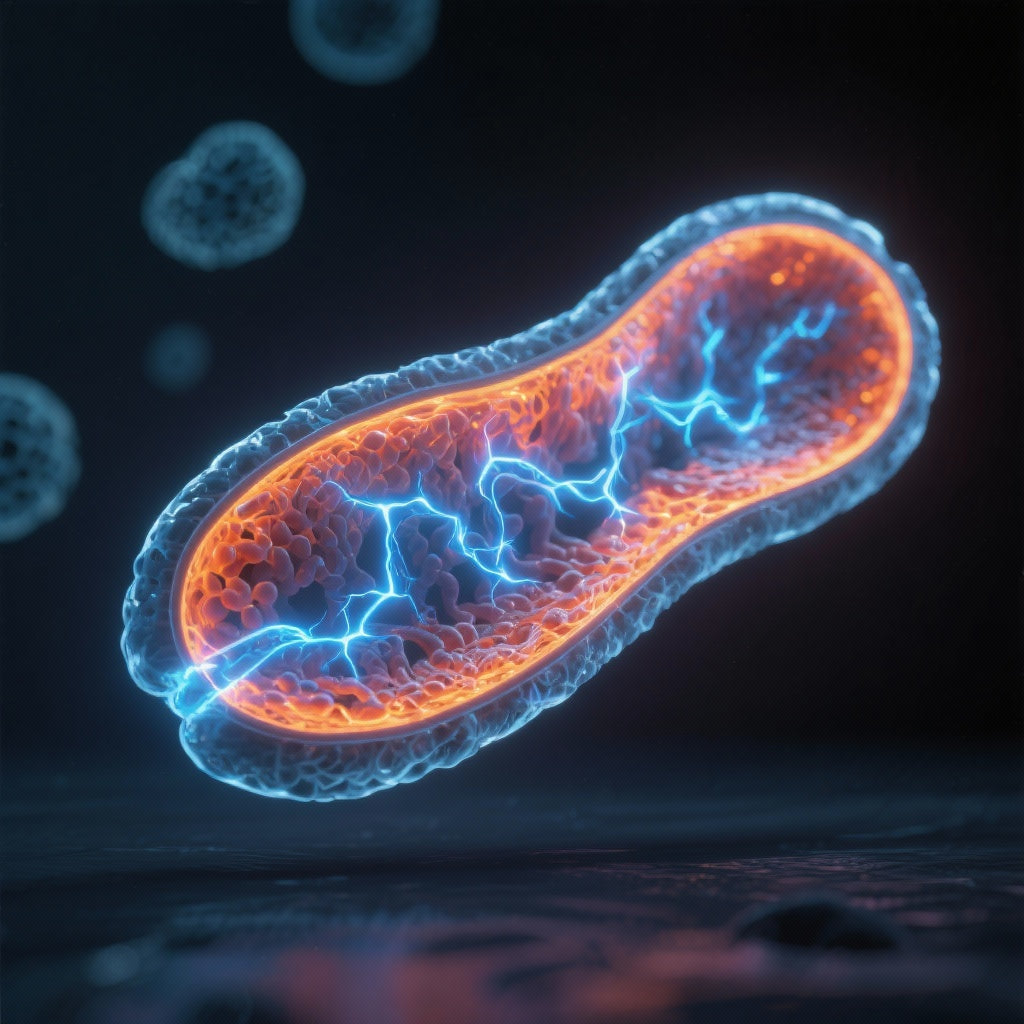Do you constantly feel tired, even after a good night's sleep? Do you feel like your internal "battery" is always depleted? The key to your vitality might not be in an extra cup of coffee, but deep within each of your cells. Welcome to the fascinating world of mitochondria .
These microscopic organelles are the true powerhouses of your body. They are responsible for converting the food you eat into usable energy. When your mitochondria are functioning optimally, you feel sharp, energetic, and focused. But when they falter, your entire system suffers. In this comprehensive guide, we'll explore what mitochondria are, why they are so crucial to your well-being, and most importantly, how you can naturally support them to unlock your full energy potential.
What is a mitochondrion? A deep dive into the heart of your cells
Imagine a bustling city. To function, it needs electricity. Mitochondria are the power plants of the "city" that each of your cells represents. Hundreds, even thousands, of them are found in almost every cell of the body, especially in energy-intensive organs like the heart, brain, and muscles.
More than just "power plants"
The most well-known function of mitochondria is the production of Adenosine Triphosphate (ATP) , the body's primary energy molecule. ATP fuels virtually all biological processes: muscle contraction, nerve transmission, protein synthesis, and so on. Without a constant supply of ATP, life as we know it would be impossible.
But their role doesn't stop there. Mitochondria are also involved in a multitude of other vital processes:
- Regulation of cellular metabolism: They decide which nutrients to use as fuel.
- Cell signaling: They communicate with the rest of the cell to regulate its growth and programmed death (apoptosis).
- Hormone synthesis: They play a role in the production of steroids such as cortisol and testosterone.
A unique DNA and a fascinating origin
Remarkably, mitochondria possess their own DNA (mtDNA), distinct from the DNA contained in the cell nucleus. This characteristic supports the theory that mitochondria were once independent bacteria that, billions of years ago, formed a symbiotic relationship with our ancestral cells. This mitochondrial DNA is inherited almost exclusively from the mother and is particularly vulnerable to damage.
The direct link between your mitochondria and your daily well-being
The health of your mitochondria is a direct reflection of your overall health. Even mild mitochondrial dysfunction can have profound repercussions on your energy, cognition, and longevity.
"Mitochondrial dysfunction is now recognized as a key factor in the aging process and the development of most chronic diseases of our time."
– Dr. Lee Know, ND, author of “Mitochondria and the Future of Medicine”
Energy and vitality: the first sign of good mitochondrial health
The most obvious symptom of impaired mitochondrial function is persistent and unexplained fatigue . This isn't just tiredness after a long day, but a profound exhaustion that doesn't improve with rest. If your cells aren't producing enough ATP, your entire body is functioning at a reduced capacity.
Conversely, when your mitochondria are thriving, you feel:
- Stable and sustainable energy throughout the day.
- Improved mental clarity and increased concentration (the "brain fog" dissipates).
- Improved physical endurance and faster recovery after exertion.
- Increased resilience to stress.
The silent enemies of your mitochondria
Our mitochondria are constantly under attack from the stresses of modern life. Understanding these threats is the first step to protecting them.
Oxidative stress: a constant battle
The very process of energy production generates reactive byproducts called free radicals . It's a bit like the smoke coming out of a factory. A certain level is normal, but an overproduction or mismanagement of these free radicals leads to "oxidative stress," which directly damages mitochondrial DNA, proteins, and cell membranes. This is one of the main causes of cellular aging.
Chronic inflammation and a poor diet
A diet high in sugars, refined carbohydrates, and processed vegetable oils promotes a state of chronic, low-grade inflammation. This constant inflammation disrupts cell communication and puts mitochondria under pressure, forcing them to work inefficiently and produce even more free radicals. It's a vicious cycle.
The main culprits in food include:
- Sugar and high fructose corn syrups: They overload mitochondria and promote inflammation.
- Trans fats and oxidized vegetable oils: They damage mitochondrial membranes.
- Ultra-processed foods: They are often low in essential nutrients and high in pro-inflammatory additives.
Natural strategies to revitalize your mitochondria
The good news is that you have the power to influence the health of your mitochondria. By adopting the right habits, you can not only protect them, but also stimulate the creation of new mitochondria (a process called mitochondrial biogenesis).
1. Nutrition: the fuel for your cells
Feed your mitochondria with nutrient-dense, antioxidant-rich foods. Consider a colorful diet rich in:
- Polyphenols: Found in berries, green tea, raw cocoa, and dark leafy green vegetables.
- Good fats: Avocados, extra virgin olive oil, nuts, seeds and oily fish rich in omega-3.
- High-quality proteins: Essential for building and repairing cellular structures.
For ideas on how to incorporate these superfoods, explore our recipe blog .
2. Physical exercise: the signal of growth
Exercise, particularly high-intensity interval training (HIIT) and endurance training, is one of the most powerful ways to stimulate mitochondrial biogenesis. When you push your body, you create an energy demand to which your cells respond by building more mitochondria to be more efficient next time.
3. The power of adaptogens and targeted nutrients
Certain natural compounds have a particular affinity with mitochondria. Adaptogens, for example, help the body better manage stress, including cellular stress. Among them, one ancient substance stands out for its action on mitochondrial health: Shilajit .
Shilajit PURVAL: an ancient ally for your mitochondria
Shilajit is a natural, mineral-rich resinous substance that seeps from the rocks of the Himalayan mountains. It has been used for centuries in Ayurvedic medicine for its ability to enhance energy and resilience. Its secret lies in its unique composition, particularly its high fulvic acid content.
How does fulvic acid support your mitochondria?
Fulvic acid acts as a true conductor of cellular energy. It helps transport nutrients and minerals directly into cells, where mitochondria can utilize them. Furthermore, it is a powerful antioxidant that helps neutralize free radicals, thus protecting mitochondria from oxidative damage. Studies suggest it may help stabilize key nutrients like CoQ10, another essential component for mitochondrial energy production.
By improving the efficiency of nutrient transport and protecting against oxidative stress, Shilajit helps mitochondria function at their full potential, resulting in better ATP production and an increased feeling of vitality.
Our Shilajit Resin: purity and concentration
At PURVAL, we are committed to providing the highest quality, pure, and potent Shilajit resin. Our purification process ensures a contaminant-free product while preserving its richness in minerals and fulvic acid. Incorporating a small amount of our resin into your morning routine can be a simple yet profound way to support the very foundation of your energy.
FAQ: Your questions about mitochondrial health
How can I tell if my mitochondria are unhealthy?
Common signs include chronic fatigue, brain fog, low endurance, slow recovery after exertion, and unexplained muscle pain. While there is no simple home test, improvement in these symptoms following lifestyle changes is a good indicator.
How long does it take to improve mitochondrial function?
The effects can vary, but with consistent changes in diet, exercise, and targeted supplementation, many people report improved energy levels within weeks. The creation of new mitochondria is an ongoing process that benefits from a long-term commitment.
Is intermittent fasting good for mitochondria?
Yes, intermittent fasting is an excellent way to boost mitochondrial health. It promotes a process called "mitophagy," where the cell cleans and recycles old and damaged mitochondria, making room for new, more efficient ones.
Conclusion: Take control of your energy
Your energy is not a finite and mysterious resource. It is the direct result of the health of billions of tiny energy centers working tirelessly for you. By understanding the vital role of mitochondria and adopting strategies to nourish and protect them, you take control of your vitality at its source.
Don't wait until you feel completely exhausted to take action. Every healthy meal, every workout, and every conscious lifestyle choice is an investment in your energy reserves. What's the first habit you'll adopt today to nurture your mitochondria?
For more tips on a healthy lifestyle, visit our news and lifestyle sections.











